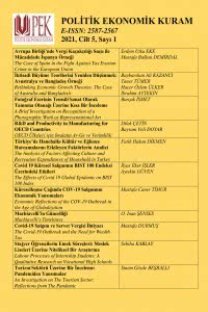Platon'un Sosyal Kuramı
Bu çalışma, Platon’un, nasıl bir biraradalık sorusuna verdiği yanıtları ortaya sermeyi amaçlıyor. Ona göre arzu edilen sosyallik, bir toplumsal bütün, en nihayetinde aklın egemenliğinde, bilgece, felsefece yönetilen bir yapının ifadesi olabilir. Platon, karmaşık, görünür, bilinir olan toplumsal çelişkiler yumağının üzerine her ne kadar tam oturmayacağını sezse de, kusursuz, ideal bir sosyal tasarım giysisi giydirmeyi dener. Bu bitimsiz çabanın sürekliğini Devlet, Devlet Adamı ve Yasalar metninde görünür kılmak bu yazının çıkış noktası. Vardığımız noktaysa toplumsal gerçekliğin, çelişkiler yumağının, katı ve keskin bir biçimde ideal olana, olması gerekene tabi kılınması yönünde. Biraradalık eksenli soruşturmamız boyunca, olan/olması gereken ayrımına/gerilimine ve bu ikiliğin bir kılınmasına dönük araçların çözümlenişine tanık olmaktayız.
Anahtar Kelimeler:
Biraradalık, Birey, Toplum, İdeal, Akıl, Yasa, Bilge Yönetici
On the Plato's Social Theory
This study aims to reveal Plato's responses to the question of how a togetherness is. According to him, the desired sociability, a harmonic social whole could be an expression of a structure which ultimately, in the hegemony of the reason, wisely, philosophically managed. Plato tries to dress a pure, ideal social design garment on the social reality but he discerns that it is not fully fit on the complex, visible, known social contradiction whole. It is the starting point of this paper to illuminate these continuation of endless effort which is visible in the text of the State, Statesman and Laws. At the point we have reached, social reality, the whole social contradictions, ought to be rigidly and sharply subordinated to the ideal, what it ought to be. Throughout our investigation which is related to togetherness, we observe the distinction / tension that is included is/ought to determination and analysis of the means which is render this duality to harmonic unity.
Keywords:
Togetherness, Individual, Society, Ideal, Reason, Law, Wise Man,
___
- Cartledge, Paul. (2007). “Greek political thought: the historical context” İçinde: The Cambridge History of Greek and Roman Political Thought. Cambridge: Cambridge University Press.
- Klosko, George (2006). The Development of Plato’s Political Theory. New York: Oxford University Press.
- Laks, André. (2007). “The Laws” İçinde: The Cambridge History of Greek and Roman Political Thought. Cambridge: Cambridge University Press.
- Platon. (1999). Devlet. Çev.: Sabahattin Eyuboğlu ve M. Ali Cimcoz. İstanbul: İş Bankası Kültür Yayınları._____. (2011). Devlet Adamı. Çev.: Furkan Akderin. İstanbul: Say Yayınları._____. (2012). Yasalar. Çev.: Candan Şentuna ve Saffet Babür. İstanbul: Kabalcı Yayıncılık._____. (2017). Gorgias. İçinde: Diyaloglar. Çev.: M. C. Anday. İstanbul: Remzi Kitabevi.___________. Kratylos. İçinde: Diyaloglar. Çev.: T. Aktürel. İstanbul: Remzi Kitabevi.___________. Kharmides. İçinde: Diyaloglar. Çev.: T. Gökçöl. İstanbul: Remzi Kitabevi.___________. Kriton. İçinde: Diyaloglar. Çev.: T. Gökçöl. İstanbul: Remzi Kitabevi.___________. Sokrates’in Savunması. İçinde: Diyaloglar. Çev.: T. Aktürel. İstanbul: Remzi Kitabevi.
- Rowe, Christopher. (2007). “The Politicus and other dialogues”İçinde: The Cambridge History of Greek and Roman Political Thought. Cambridge: Cambridge University Press.
- Schofield, Malcolm. (2007). “Approaching the Republic” İçinde: The Cambridge History of Greek and Roman Political Thought. Cambridge: Cambridge University Press.
- Strauss, Leo. (1978). The City and Man. Cambridge: Cambridge University Press.
- Welles, C. Bradford. (1948). “The Economic Background of Plato’s Communism” The Journal of Economic History 8 (Ocak): 101-114.
- Wood, Ellen Meiksins. (2008). Yurttaşlardan Lordlara. Çev.: Oya Köymen. İstanbul: Yordam Kitap.
- Yayın Aralığı: Yılda 4 Sayı
- Başlangıç: 2017
- Yayıncı: Ahmet Arif EREN
Sayıdaki Diğer Makaleler
“Çin Mucizesi”nin Bir Çıkmazı: Bölgesel Eşitsizlikler
Partizan Modelin Çin ve Türkiye Ekonomilerine Etkisinin İncelenmesi: Ampirik Bir Analiz
Yaşanan Değişim ve Dönüşümler Perspektifinde Küreselleşme Sürecinde Bütçe Politikaları
Kapitalizm, Devlet ve Köylü: Gaziantep Köylerinde Ampirik Bir Çalışma
Bilgen TAŞDOĞAN, Zeynep AĞDEMİR
Nagehan KARANFİL, İlhan EROĞLU
Kamu Kesimi Açıklarının Finansmanında Maliye Politikasının Rolü
Avrupa Birliği ve Türkiye’de Asgari Ücret Uygulamasının Karşılaştırmalı Değerlendirilmesi
Ekonomik Kırılganlıklar; G-20 Ülkeleri Üzerinde Bir İnceleme
